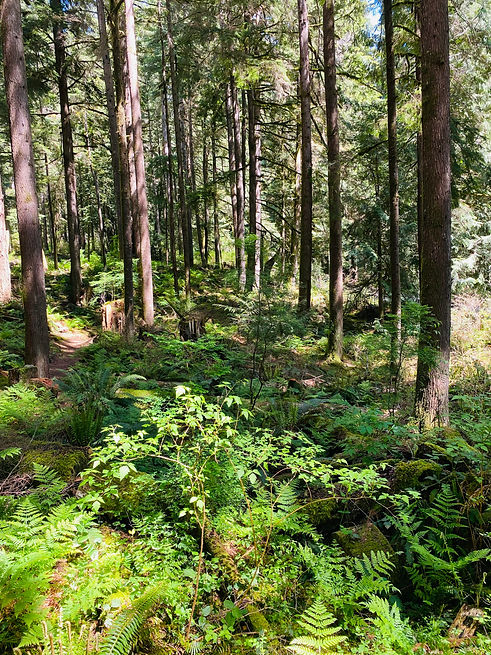
Food Forest Family
Co-operative
We are grateful to the, Heiltsuk, Nuxalk, Wuikinuxv, Gwa’sala-‘Nakwaxda’xw, Da’naxda’xw, Quatsino, Nuu-chah-nulth, Kwakwak’awakw, Ditidaht, Pacheedaht, Saanich, Scia’new, Malahat, Snaw-naw-as, Songhees, T’sou-ke, and Snuneymuxw Nations as we work, learn, and live on their traditional and unceded territories. As uninvited guests we have the responsibility to respect Indigenous sovereignty and stewardship practices
Who We Are and What We Do
Vision
Mission
An abundant Vancouver Island with regenerative, just, and democratic food systems that inspire creativity, embrace diversity, and enhance prosperity for life on this planet.
A co-op that harnesses the power of regenerative agriculture to establish a democratic and equitable food system founded on meaningful community connections and reciprocity. The co-op reinvents local social and economic ties to nature through activities that will grow the resilience, health, and vitality of communities.
Values
Solidarity: Standing up for our fellow humans with the conviction that all people are created equal and that each of us has value to offer. The Food Forest Family is fully committed to shared governance and deliberative democracy where everyone affected can be heard and diversity is embraced and protected.
Peace: A commitment to justice and security for all through strictly non-violent means. Building equitable and sustainable food systems that support harmony and shared thriving, to offer ethical food supply chain alternatives to the community.
Love and Caring for Others: Guided by love, we show compassion to our community and ourselves understanding our prosperity as interconnected and seeking to contribute towards our shared well-being. Guided by caring we see all members as fully human, deserving of dignity and compassion, assuming trust, practicing generosity, and solving challenges that arise through restorative justice.
Life: A profound respect for and appreciation of all life. With this value, we strongly support the idea of humans as stewards of land and keystone species for a future of shared prosperity.
Democracy: A consensus-based deliberative democracy that facilitates effective decision-making through a commitment to common values, lifelong learning, and expanding empathy through shared stories.
Strategic Goals
Resilient Food Sovereignty: A Vancouver Island where we are empowered to own and control our food resources.
Nurture our Environment: Thriving and resilient Vancouver Island ecosystems with abundant biodiversity, stewarded by connected communities.
Community Kinship: Vancouver Island communities that are interconnected and mutually supportive, guided by the ethics of care and shared prosperity. Nurturing meaningful connections through creative expression, inspiring work, and equal power relations.
Nurture Holistic Health: Contributing to community health through low-barrier access to fresh, non-toxic, and nutritionally diverse foods, low-barrier access to herbal and natural medicines.
Empowerment: Providing educational and training opportunities related to creating food abundance, ecosystem stewardship, holistic wellness, and the practice of shared governance.
Transformational Democracy: A functional and vibrant voluntary membership-based cooperative accountable to shared values. Decisions are made through consensus-based democratic practices and members share the harvests equally.

The Family
Jasmine Tomczyk - Founder

How Regenerative Agriculture Transforms our Impact on and Relationship with Nature
While the existing global industrial food system continues to degrade our planet, regenerative agriculture offers us a way to feed our communities in ways that benefit ecosystems rather than destroy them. This paradigm shift is built on the idea that humans can return to our role as keystone spices living in ways that increase abundance for all living things. We believe this shift is not just important but necessary for the long term survival of our species


Industrial Agriculture
-
Drains aquifers
-
Decreases biodiversity
-
Habitat loss
-
Ocean and freshwater dead zones
-
Soil erosion
-
Relies on ever increasing use of plastics and poisons (pesticides)
-
Produces significant GHG emissions
-
Built on the exploitation of humans, animals, and the land

Regenerative Agriculture
-
Recharges aquifers
-
Increases biodiversity
-
Restores habitat
-
Builds soil
-
Minimizes use of plastics and limited organic pest and disease control only
-
Sequesters carbon
-
Built on a profound respect and appreciation for humans, animals, and the land

"What We See"

"What We Don't See"
How is it possible for one way of growing food to produce so much greenhouse gas emissions and waste, while another way captures greenhouse gasses and produces almost no waste? The answer lies in the system, what we see, VS what we don't.